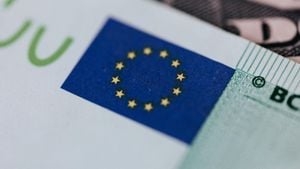A wave of excitement swept across Uruguay as the nation celebrated the election of Yamandú Orsi as its new president following the runoff vote. Orsi, representing the left-wing Broad Front coalition, secured victory over Álvaro Delgado, the candidate from the ruling conservative coalition, marking the return of leftist governance after five years under the center-right party. With nearly 90% voter turnout, Uruguayan citizens cast their ballots on November 24, 2024, demonstrating their engagement and commitment to democracy.
The election results revealed Orsi winning with approximately 49.8% of the vote, defeating Delgado, who garnered around 45.9%. The results followed closely behind pre-election forecasts, which had hinted at Orsi being the likely victor. The atmosphere was electric, particularly in the capital, Montevideo, where supporters of the Broad Front took to the streets, waving flags and chanting as the news of Orsi’s win became official. Celebratory messages circulated on social media, encapsulating the sentiment of hope and change. “Joy will return for the majority,” the Broad Front declared through its platforms.
Yamandú Orsi, who previously served as the mayor of Canelones, is not just any newcomer on the political scene; he is seen as part of the political legacy of former president José Mujica, who previously captured the hearts of many by embracing simplicity and humility. Orsi’s own background reflects similar modest beginnings, growing up without electricity and working his way up through the ranks to political office, beginning as a history teacher and later becoming mayor.
The incoming administration is expected to bring forth initiatives aimed at revitalizing the economy, addressing pressing social issues, and fostering security, reshaping many aspects of Uruguayan life. Economic concerns were central to voters' priorities, especially the rising cost of living, rampant unemployment, and the widespread fear over crime and violence linked to drug trafficking. Orsi’s campaign pledges included efforts to improve support for low-wage workers, expand early childhood education, and tackle youth unemployment.
Despite its focus on economic revitalization, Orsi’s win also represented a rejection of the current government’s handling of social issues. Outgoing president Luis Lacalle Pou may have maintained moderate approval ratings, yet Miguel's administration faced criticisms due to rising crime rates and stagnant wages. Notably, analysts pointed out the discontent surrounding corruption scandals and disapprovals arising from the administration's austerity measures. The Broad Front’s strategy to unseat the National Party mirrored sentiments of change among the electorate, reflecting broader trends seen across many democracies grappling with similar issues.
Former president Mujica, who played a significant role during Orsi’s campaign, endorsed his former protégé's vision of collaboration and dialogue rather than division. This philosophy was echoed by Orsi himself, who remarked, “I aim to be the president who calls for national dialogue again and again.” His focus on inclusivity and working across the political spectrum seeks to unify rather than polarize the electorate.
The election proceeded following legislative elections held just weeks earlier, and the political dynamics have transformed significantly. While Orsi’s Broad Front has garnered significant Senate seats, it still lacks outright control over the Chamber of Representatives, necessitating collaboration and coalition-building to push through legislation effectively.
Analysts anticipate this election may signal resistance to the leftward trend seen across Latin American democracies, wherein right-wing populism has made significant strides. Orsi’s victory revitalizes hopes for progressive policies to take root once again, with him referencing the need for “national dialogue,” ensuring all voices, even those who voted against him, would be included moving forward.
The aftermath of the election indicated cautious optimism among leaders and citizens alike. Orsi's platform encouraged friendly relations with neighboring countries and maintained commitments to balancing regional partnerships bought at the expense of the country’s integrity and sovereignty. The diplomatic relationships Orsi intends to establish would likely reflect the progressive and cooperative spirit of his leadership.
Challenges, of course, remain. An undeniable issue is the high childhood poverty rate and associated socio-economic disparities threatening the social fabric of the nation. Orsi's government will have to face these realities head-on to meet the optimism expressed during the election. Policymakers will be called upon to strike the right balance between fiscal responsibility and the expansion of social programs to lift all citizens.
Soon after the election, outgoing President Lacalle Pou extended congratulations, pledging his intention to facilitate a smooth transition of power, which signifies stability rather than turmoil following such political shifts. This smooth transition is not merely symbolic; it indicates the orderliness of democracy upheld by Uruguayans spirited by their wishes. Lacalle Pou's remarks imply he recognizes the significance of respecting the electoral process and fostering democracy's fundamentals.
Even as the new government prepares to take office on March 1, 2025, there is palpable tension about the direction Yuraguay will take economically and socially. Supporters of Orsi are optimistic about the potential for change and the resurgence of progressive policies reminiscent of the Broad Front's previous rule, which was known for major reforms like the legalization of abortion and same-sex marriage.
The nature of Orsi’s presidency will be deflected not merely by economic imperatives but increasingly by the synchronization among the political class to balance diverse interests. Observers will be eagle-eyed as the year progresses, monitoring movements toward realizing ambitious agendas built out of hope for renewal and reform.
The election results reaffirm Uruguay's political resilience, demonstrating the ability of its citizens to express their democratic voices through the ballot. Yamandú Orsi's presidency opens the door for new possibilities. Whether these possibilities lead to substantive, positive changes within Uruguayan society remains to be seen as the new administration begins addressing urgent socioeconomic challenges and driving national dialogue moving forward.



